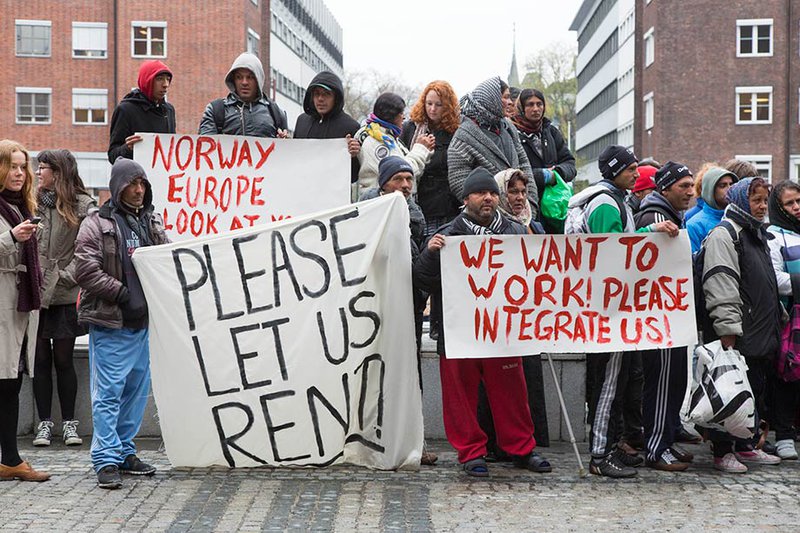
Romanian demonstrating for work and integration in front of the town hall in Oslo, Norway, in 2013. Robert B. Fishman/DPA/PA Images. All rights reserved.
These are not times to conflate or deepen some of the fractured lines along which states from the old western and eastern parts of the EU carefully tread. But a decade after joining the EU one must question how EU migrant labourers, particularly from Romania but more widely from the EU’s Eastern European member states, continue to be treated both as threats to western European societies and as workers for whom exploitation and abuse is acceptable treatment.
As EU nationals with the fundamental right to travel and work throughout the EU, these individuals should rightfully expect to have their labour rights upheld irrespective of the member state in which they work. They would, however, be a bit foolish to do so. Migrant labourers from the eastern half of the continent continue to face high levels of discrimination and exploitation at their places of work, with many suffering everything from poverty-level wages and punishingly long hours to the threat of expulsion and sexual assault. Thus while the economic consolidation of the EU has made it possible to move between labour markets, it has not closed the spaces in which and mechanisms through which exploitation flourishes, even in the case of EU citizens themselves.
Cross-sector exploitation
While undoubtedly Romania’s own challenges with poverty, corruption and law enforcement are a big part of the issue, one shouldn’t dismiss the other side of this story. The companies and societies of western Europe reap huge benefits from the work performed by their eastern counterparts under conditions and at a price point that few in-country nationals would accept. This is evident in areas like the textile industry, where a 2016 report from the Clean Clothes Campaign highlighted the very low wages and problematic working conditions in Albania, Bosnia-Herzegovina, Macedonia, Poland, Romania and Slovakia.
The problem is not limited to textile production, however. For Romanians, a recent report co-funded by the Europe for Citizens programme found that they are primarily working – often informally – in construction, domestic care, agriculture, and manufacturing and services. As many other pieces on this site have documented – such as Letizia Palumbo and Alessandra Sciurba on the use of Romanian labourers in Sicilian agriculture – all of these industries are rife with labour abuse. The Europe for Citizens report found persistent and pervasive abuse, from wage theft to denial of social benefits, and noted that “the number of reported abuses against workers exceeds by far the number of interventions that have been made in response to exploitative practices”.
“While the West takes pride in itself, most of the rest of the world lives in shame”
– Orhan Pamuk, Museum of Innocence
The Guardian recently published a report regarding Romanian female agricultural workers in Italy who had experienced physical abuse, including rape, the withholding of payment, and other forms of abuse. Unfortunately, it is not an atypical scenario for women whose economic vulnerability is tacitly, but surely, exploited by “fellow EU citizens”. Al Jazeera, as part of a report on ‘modern slavery’ in the UK, highlighted the case of Romanian workers employed in low paid jobs and abused by their employers. This might not come as a surprise in a country where Romanians have been disrespectfully and biasedly depicted by mainstream media for years on end, the same country that very clearly profits from the existence of EU migrant labour domestic carers, construction workers, and service industry providers.
A failure to protect
Companies operating in these sectors require cheap labour to remain profitable. To keep these sectors operating and prices down for consumers the EU and member states turn a blind eye to how they function, understaffing and underfunding labour regulators to the point where they lose all hope of reigning in exploitative work relations. This catches EU citizens, as well as ‘irregular’ migrants, in the lurch.
Subcontracting recruiters, employed by some of Europe’s largest companies, contribute to perpetuating practices that are detrimental towards EU employees from the eastern side of the continent. A recent BBC report on the situation of truck drivers employed from Romania and other eastern European countries by IKEA subcontractors is a case in point. It details the poor quality pay of Romanian drivers who are paid low, eastern European wages while working for extended periods of time in western Europe in ways that are inconsistent with the law wages of those countries. It also highlights their harsh working and living conditions, including at times the lack of access to toilets and running water, as well as extended periods of sleeping and eating in cabins due to insufficient daily allowance payments. A Dutch court has reportedly come to describe the situation of eastern European truck drivers as “an inhumane state of affairs”, but as long as the ‘quick and cheap gain’ logic prevails over that of decent and dignified treatment of workers, being an EU citizen does not necessarily come with the guarantee of better conditions of work.
For many western European companies and countries, the work of EU migrant labourers brings benefit and profit, without, it seems, challenging the mindsets that make ‘the other side of the EU’ an acceptable source of exploitable and cheap labour. This should not and cannot be tolerated any longer. There is great risk that, as the EU navigates towards potential “two-speed” scenarios, the situation will only get worse. So as we go forward, all EU countries must ask themselves what sort of Union it wants to be. For unless the EU grants all its citizens equal and fair treatment, many might find themselves asking how much is EU citizenship actually worth?
Read more
Get our weekly email






Comments
We encourage anyone to comment, please consult the oD commenting guidelines if you have any questions.